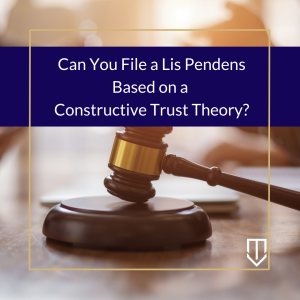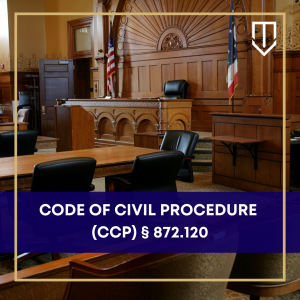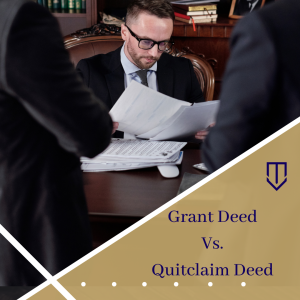 The Marketable Record Title act provides a statutory time limit to eliminate certain liens. Specifically, the purpose is to enhance the marketability of property by fixing an expiration date for certain interests, which are generally ancient mortgages, deeds of trust, unexercised options, powers of termination, unperformed contracts for the sale of real property, dormant mineral intersts, and abandoned easements, while also providing a procedure for allowing the interests to be preserved. In other words, the Act helps to simplify and facilitate real property transactions. In this blog, we’ll delve into what the Marketable Record Title Act entails, its significance, and how it impacts property owners.
The Marketable Record Title act provides a statutory time limit to eliminate certain liens. Specifically, the purpose is to enhance the marketability of property by fixing an expiration date for certain interests, which are generally ancient mortgages, deeds of trust, unexercised options, powers of termination, unperformed contracts for the sale of real property, dormant mineral intersts, and abandoned easements, while also providing a procedure for allowing the interests to be preserved. In other words, the Act helps to simplify and facilitate real property transactions. In this blog, we’ll delve into what the Marketable Record Title Act entails, its significance, and how it impacts property owners.
What is the Marketable Record Title Act (MRTA)?
The Marketable Record Title Act is a piece of legislation adopted by many states in the United States with the aim of clarifying and simplifying real property titles. Its primary objective is to extinguish certain old and dormant interests in real estate, thereby providing buyers with a more secure and marketable title. (see Robin v. Crowell (2020) 55 Cal.App.5th 727.)
 California Partition Law Blog
California Partition Law Blog


 Real property partitions help co-owners and co-tenants divide real estate that they purchased together.
Real property partitions help co-owners and co-tenants divide real estate that they purchased together. Under California’s Civil Code, real property refers to land, and things affixed to land such as houses. (Civ. Code § 658.) When people think of “property” they may envision a large lake house or a humble home. But this is only one type of property – real property. Personal property, on the other hand, is a broad term that encompasses property rights in basically everything else. A patent is property, and so are the apples that grow on trees in someone’s back yard, and so are the pipes and plumbing that run underneath someone’s house.
Under California’s Civil Code, real property refers to land, and things affixed to land such as houses. (Civ. Code § 658.) When people think of “property” they may envision a large lake house or a humble home. But this is only one type of property – real property. Personal property, on the other hand, is a broad term that encompasses property rights in basically everything else. A patent is property, and so are the apples that grow on trees in someone’s back yard, and so are the pipes and plumbing that run underneath someone’s house. An order determining succession to real property is an alternative petition to get a court order transferring the property. (Prob. Code § 13154.) If the estate is small enough, and a successor to the decedent has proof that they are entitled to a certain piece of property, then they may use this process to become a title owner.
An order determining succession to real property is an alternative petition to get a court order transferring the property. (Prob. Code § 13154.) If the estate is small enough, and a successor to the decedent has proof that they are entitled to a certain piece of property, then they may use this process to become a title owner. A lis pendens is a notice that a lawsuit has been filed against real property which could affect that property’s title. The lis pendens notifies any potential buyer that there is a lawsuit involving a real property claim. This is important because a potential buyer with knowledge of the lis pendens will be bound by the court’s eventual judgment on the lawsuit.
A lis pendens is a notice that a lawsuit has been filed against real property which could affect that property’s title. The lis pendens notifies any potential buyer that there is a lawsuit involving a real property claim. This is important because a potential buyer with knowledge of the lis pendens will be bound by the court’s eventual judgment on the lawsuit. California Code of Civil Procedure section 872.120 grants the court continuing jurisdiction to hear all motions and issue any necessary decrees in order to fulfill the purpose of the partition title, which aims to provide the court with broad statutory authority.
California Code of Civil Procedure section 872.120 grants the court continuing jurisdiction to hear all motions and issue any necessary decrees in order to fulfill the purpose of the partition title, which aims to provide the court with broad statutory authority.  A deed is a legal instrument, evidenced in writing, to confirm the ownership interest or legal rights of an owner of real property. Essentially, a deed is necessary to determine the titleholder of a piece of real estate. Moreover, a deed grants an owner of real property legal rights to convey, sell, or transfer the property. Therefore, when purchasing a piece of real property, it is extremely important for a person to obtain a deed in order to evidence their ownership in writing and protect their legal rights in the property.
A deed is a legal instrument, evidenced in writing, to confirm the ownership interest or legal rights of an owner of real property. Essentially, a deed is necessary to determine the titleholder of a piece of real estate. Moreover, a deed grants an owner of real property legal rights to convey, sell, or transfer the property. Therefore, when purchasing a piece of real property, it is extremely important for a person to obtain a deed in order to evidence their ownership in writing and protect their legal rights in the property.  The deed to a property is the most important document a property owner has. It describes the title and its associated rights while operating as the grant of the property itself. But not all deeds are created equal.
The deed to a property is the most important document a property owner has. It describes the title and its associated rights while operating as the grant of the property itself. But not all deeds are created equal.